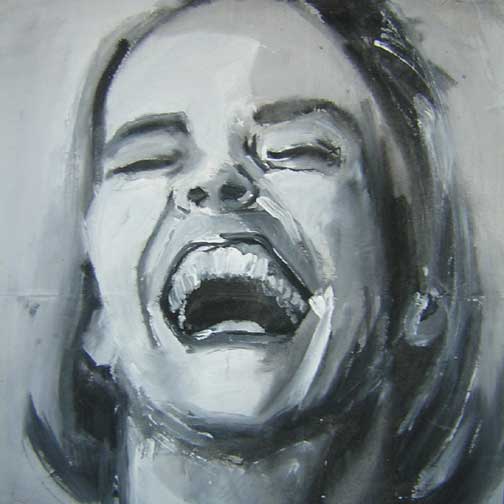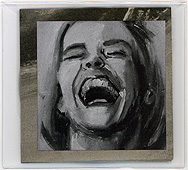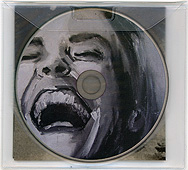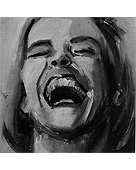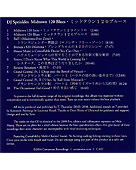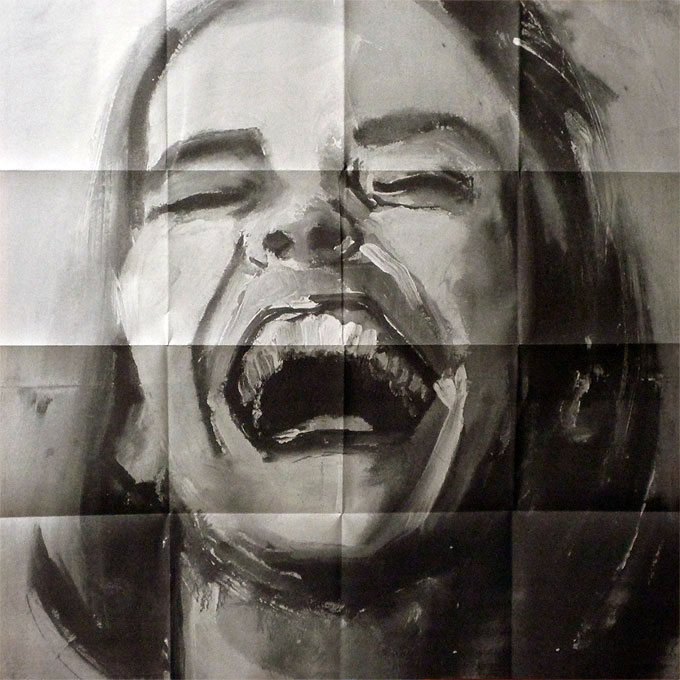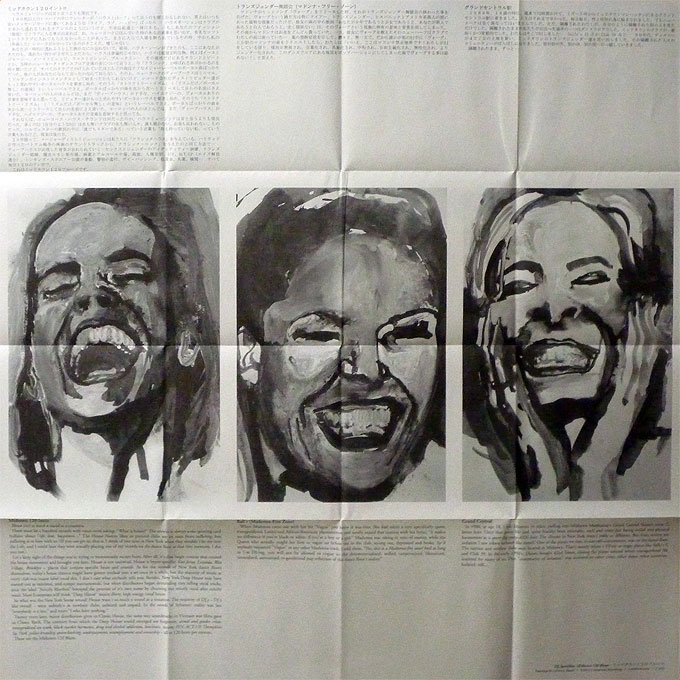|
comatonse recordings shop ショップ |
CD in archival vinyl pouch with double-sided insert card (100mm x 100mm), phonograph style anti-static inner sleeve, and 4x4 panel poster insert printed on newsprint (472mm x 472mm).
|
|
dj sprinkles midtown 120 blues ミッドタウン120ブルーズ (2008/2014) |
DJ Sprinkles: Midtown 120 Blues | Full-length CD Album | May 31 2014 | C.022
DJ Sprinkles is please to announce the re-issue of Midtown 120 Blues, self-released on Comatonse Recordings with custom packaging hand assembled by Terre herself.
First released in 2008, DJ Sprinkles' debut full length album continues with themes from 1998's "Sloppy 42nds: A tribute to the 42nd Street transsexual clubs destroyed by Walt Disney's buyout of Times Square" (a track featured on Ame's "Coast2Coast" DJ mix compilation for NRK Records in 2007). While the world celebrates the revial of New York House Music, constructing utopian fictions about the genre as it goes along, DJ Sprinkles retreats deep into the bowels of house. This is the rhythm of empty midtown dancefloors resonating with the difficulties of transgendered sex work, black market hormones, drug & alcohol addiction, racism, gender & sexual crises, unemployment, and censorship.
The audio on the 2014 CD is identical to the 2008 first edition and subsequent represses on Mule Musiq. There are no plans for a vinyl edition because the bass spatialization effects that give many of these recordings their sonic character are incompatible with vinyl mastering techniques.
|
hype ハイプ |
- #1 Album of 2009 in Resident Advisor staff poll.
★★★★★ (5 of 5 stars) from Cisco Music (Japan), August 2008.
★★★★★ (5 of 5 stars) from Electronic Beats, January 2009.
★★★★★★★★★☆ (9 of 10 stars) from Music Magazine (Japan), October 2008.
Dont Rhine (Ultra-red) 2008 Year-end Round Up Artist of the Year, #2 Album.
#2 in Pete Chambers (Resident Advistor) Top 10 Albums 2008.
#3 Album of the Year 2008 in Little White Earbuds.
Juno Records (UK) Top 10 Bestseller of the Week, February 1 2009 (ranked #9).
#14 Album of 2009 in Boomkat (UK).
#17 Album of 2009 in Fact Magazine (UK).
"Midtown 120 Blues" listed in Fact Magazine Tracks of the Week, February 20-27 2009.
Holger Klein (Spex): "The world's first discourse house album."
|
cd track list cdトラックリスト |
- Midtown 120 Intro・ミッドタウン120イントロ
(Excerpt / 抜粋) 2:47 2.2MB MP3 128kB/s - Midtown 120 Blues・ミッドタウン120ブルース
(Excerpt / 抜粋) 1:05 900KB MP3 128kB/s - Ball'r (Madonna-Free Zone)・トランズジェンダー舞踏会(マドンナ・フリー・ゾーン)
(Excerpt / 抜粋) 1:08 944KB MP3 128kB/s - Brenda's $20 Dilemma・ブレンダちゃんの$20のジレンマ
(Excerpt / 抜粋) 1:01 848KB MP3 128kB/s - House Music is Conrollable Desire You Can Own・ハウスミュージックは所有することができる制御可能な要望
(Excerpt / 抜粋) 1:12 1MB MP3 128kB/s - Sisters, I Don't Know What This World is Coming To・シスターズ、この世界はどうなりましたか
(Excerpt / 抜粋) 1:22 1.1MB MP3 128kB/s - Reverse Rotation・後戻り
(Excerpt / 抜粋) 0:58 808KB MP3 128kB/s - Grand Central, Pt. I (Deep into the Bowel of House)・グランドセントラル駅 パート1(ハウスの腸の深い場所まで)
(Excerpt / 抜粋) 1:05 900KB MP3 128kB/s - Grand Central, Pt. II (72 hrs. by Rail from Missouri)・グランドセントラル駅 パート2(列車でミズーリ州から72時間)
(Excerpt / 抜粋) 1:01 844KB MP3 128kB/s - The Occassional Feel-Good・時たま良い感じ
(Excerpt / 抜粋) 1:01 852KB MP3 128kB/s - Vinyl Remix EP: Brenda's $20 Dilemma・ブレンダちゃんの$20のジレンマ (Kuniyuki Remix)
(Excerpt / 抜粋) 1:11 984KB MP3 128kB/s
|
||
|
House isn't so much a sound as a situation. There must be a hundred records with voice-overs asking, "What is house?" The answer is always some greeting card bullshit about "life, love, happiiness...." The House Nation likes to pretend clubs are an oasis from suffering, but suffering is in here with us. (If you can get in, that is. I think of one time in New York when they wouldn't let me into the Loft, and I could hear they were actually playing one of my records on the dance floor at that very moment. I shit you not.) Let's keep sight of the things you're trying to momentarily escape from. After all, it's that larger context that created the house movement and brought you here. House is not universal. House is hyper-specific: East Jersey, Loisaida, West Village, Brooklyn - places that conjure specific beats and sounds. As for the sounds of New York dance floors themselves, today's house classics might have gotten worked into a set once in a while, but the majority of music at every club was major label vocal shit. I don't care what anybody tells you. Besides, New York Deep House may have started out as minimal, mid-tempo instrumentals, but when distributors began demanding easy selling vocal tracks, even the label "Strictly Rhythm" betrayed the promise of it's own name by churning out strictly vocal after strictly vocal. Most Europeans still think "Deep House" means shitty, high energy vocal house. So what was the New York house sound? House wasn't so much a sound as a situation. The majority of DJ's - DJ's like myself - were nobody's in nowhere clubs: unheard and unpaid. In the words of Sylvester: reality was less "everybody is a star," and more "I who have nothing."Twenty years later, major distribution gives us Classic House, the same way soundtracks in Vietnam war films gave us Classic Rock. The contexts from which the Deep House sound emerged are forgotten: sexual and gender crises, transgendered sex work, black market hormones, drug and alcohol addiction, loneliness, racism, HIV, ACT-UP, Thompkins Sq. Park, police brutality, queer-bashing, underpayment, unemployment and censorship - all at 120 beats per minute. These are the Midtown 120 Blues. |
ハウスミュージックは音と言うよりも情況です。 100枚以上のレコードの中にナレーターが「ハウスとは…?」って言うのを聞くかもしれない。答えはいつも安いメッセージカードに書いてあるような「ライフ、ラブ、ハッピー」ばっかり… ハウスネーションはクラブが不幸から逃れるられるオアシスのようにいうけど、不幸は私達と一緒にある。‥もしあなたのファッション(服装)でクラブに入る事が出来れば、ね。ニューヨークに住んでいた時のある出来事を思い出す。有名なロフトというクラブに入れてもらえなかったことがあった。まさに入口で入場を断られているその時、中から私の(作曲した)レコードがかかっているのがきこえた。嘘じゃない。 あなたが一時的に逃れようとした物がなにか忘れないで。結局、ハウス・シーンができたのも、ここにあなたがきたのも、逃れたい何かがさせたことだから。ハウスは普遍的じゃない。ハウスは超限定的な物。例えばイーストジャージー、イーストビレッジ、ウエストビレッジ、ブルックリン… その場所だけにあるサウンドとビートとか。当時のニューヨーク・ダンスフロア自体の音について言うと、今「クラシック」と呼ばれる曲がかかるのを時々聴いたけど、すべてのクラブでかけられていたほとんどの曲はクソなメジャーレーベルのボーカル曲ばっかりだった。他の人があなたになんて言ったかなんて知らない。その上、ニューヨークのディープハウスはミニマル、ミドルテンポインストロメンタルとして始まったかもしれないけど、レコード会社のディストリビュター達がもっと売れやすいボーカルハウスを要求し始め、そのうち「ストリクトリー・リズム」(「リズムだけ/ボーカル無し」の意味)というレーベルでさえ、ボーカルばっかりの曲を次から次へとリリースして自らの名前にさえ背いた。ヨーロッパの人のほとんどは、まだ「ディープハウス」が下手な、ハイエナジーの、ヴォーカルありの音楽を意味すると思ってる。 それならば、ニューヨーク・ハウス・サウンドは何だったのか。ハウスミュージックは音と言うよりも情況だった。多くのDJ(自分のようなDJ)は名も無いクラブの名も無い人々、誰も聴かない、お金も払われない、ものだった。シルヴェスターの歌詞の中に「誰でもスターである」っていう言葉も「何も持っていない私」っていう言葉もあるけど、現実は後の方。 20年経って、メージャーディストリビューションは私たちに「クラシックハウス」を与えている。ハリウッドが作ったベトナム戦争の映画のサウンドトラックから 「クラシック・ロック」を与えたのと同じ方法で… ディープハウスが出現した背景が忘れられていく:セックスとジェンダーのアイデンティティー崩壊、トランズジェンダー娼婦、闇ホルモン剤市場、麻薬とアルコール中毒、孤独、人種差別、HIV、ACT-UP(エイズ解放連合)、トンキンズ・スクエアー公園の暴動、警察の蛮行、ゲイ・バッシング、低賃金、失業、検閲… すべて毎分120のテンポで。 これはミッドタウン120ブルーズです。 |
|
|
||
|
When Madonna came out with her hit "Vogue" you knew it was over. She had taken a very specifically queer, transgendered, Latino and African-American phenomenon and totally erased that context with her lyrics, "It makes no difference if you're black or white, if you're a boy or a girl." Madonna was taking in tons of money, while the Queen who actually taught her how to vogue sat before me in the club, strung out, depressed and broke. So if anybody requested "Vogue" or any other Madonna track, I told them, "No, this is a Madonna-free zone! And as long as I'm DJ-ing, you will not be allowed to vogue to the decontextualized, reified, corporatized, liberalized, neutralized, asexualized, re-genderized pop reflection of this dance floor's reality!" |
マドンナがヒットソング「ヴォーグ」をリリースした時、それがトランズジェンダー舞踏会の終わった事を告げた。ヴォーグという踊り方は特にクイアー、トランズジェンダー、ヒスパニックとアメリカ系黒人の間にあった独特な現象だったけど、彼女の曲の中の歌詞「あなたが少年であろうと少女であろうと、あなたが黒人であろうと白人であろうと、全く関係ない」は、そのヴォーグという現象に特有の意味と背景を消してしまった。その曲からマドンナはお金をどんどん貰っていた、一方、彼女にヴォーグを教えたそのニューハーフはクラブでわたしの前に座っていた… 薬の禁断症状を示して、鬱々と、無一文で。だから誰かが私のDJ中に「ヴォーグ」とか別のマドンナの曲をリクエストしたら、わたしは「いいえ、ここはマドンナ禁止地帯です!わたしがDJをしている限り、情況が無視され、企業化され、具象化され、中和され、自由主義化され、無性化され、よりジェンダー化された、このダンスフロアにある現実をポップバージョンにしてしまった曲でヴォーグする事は認めない!」と答えた。 |
|
|
||
|
In 1986, at age 18, I left Missouri by train, pulling into Midtown Manhattan's Grand Central Station some 72 hours later. Until that point life had, quite frankly, been miserable, each and every day facing verbal and physical harassment as a queer-fag-pussy-AIDS bait. The climate in New York wasn't really so different. But from within my isolation I saw others isolated like myself. One of the places we met, in our self-containment, was on the dance floor. The nastiest and seediest clubs were located in Midtown. That's mostly where I DJ'ed, at tragic places like Sally's II and Club 59. In the early 1990's, Disney bought 42nd Street, closing the places around which transgendered life revolved for many of us. That "community of isolation" was scattered to other cities, other states, other countries. Isolated, still.... |
1986年、18歳の時に、電車で72時間かけて、ミズーリ州からミッドタウンマンハッタンにあるグランドセントラル駅に着きました。人生はそれまで辛かった。毎日毎日、性と性別の為に悩まされました。でもニューヨークは全く異なってはいませんでした。ただ、隔離されたわたしが、自分のように隔離された別の人を見ただけでした。隔離されたままの私たちが出会った場所の一つはダンスフロアでした。ミッドタウンのクラブが一番寂くかつ変態的でした。わたしはそこでDJしました… Sally's II とか Club 59 など… 90年代、ディズニーが42丁目の土地を買い、ミッドタウンのトランズジェンダー達を追い出しました。その隔離された人々のコミュニティーがばらばらになりました。皆が別の市、別の州、別の国へ引っ越していきました。 隔離されたまま、ずっと… |
|
To preserve the full dynamic range of the original recordings, this album was mastered without compression and is intentionally quieter than some. Turn up your stereo volume for best playback.
All tracks produced and published by T. Thaemlitz (BMI), 2008. Additional sounds on 7 provided by Kuniyuki. Paintings by Laurence Rassel. Thanks to Dont Rhine of Ultra-red for guidance and support. Design and text by Terre.
The audio on this CD is identical to the 2008 first edition and subsequent represses on Mule Musiq. There are no plans for a vinyl edition because the bass spatialization effects that give many of these recordings their sonic character are incompatible with vinyl mastering techniques.
Featuring Comafidelity Multi-Channel Sound. No fucking-sucking-licking-sticking without latex. Clean your works with bleach and water. Do not attempt using any part of this product as a safer sex device.
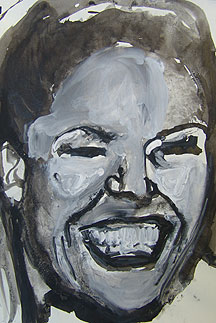 |
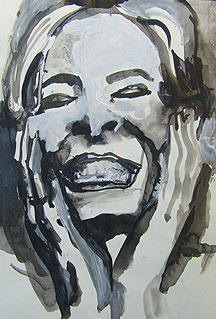 |
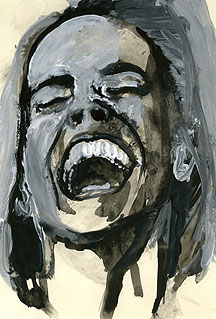 |
|
releases in this series by mule musiq (out of print) このシリーズのリリース(ミュール・ミュージック版、OP) |
|
full-length albums アルバム |
- DJ Sprinkles: Midtown 120 Blues Japan: Mule Musiq, 2008, MMD7
|
vinyl 12" singles ビニール12インチのシングル |
- DJ Sprinkles: Masturjakor (w/KiNK & the Neville Remix) Japan: Mule Musiq, 2010, MM044
- DJ Sprinkles: Sisters, I Don't Know What This World is Coming To (w/Motor City Drum Ensemble Remixes) Japan: Mule Musiq, 2009, MM038
- DJ Sprinkles: Brenda's $20 Dilemma (w/Kuniyuki Remix) Japan: Mule Musiq, 2009, MM034
- DJ Sprinkles: Grand Central, Pt. I Japan: Mule Musiq, 2008, MM033
|
compilations コンピ |
- Enjoy the Silence: Part 2 of Mule 5th Anniversary Release, Japan: Mule Electronic, 2009, MED16[JP]/MECD15[EU]. Includes "Music is Controllable Desire You Can Own" (ambient remix of "House Music is Controllable Desire You Can Own").
- I'm Starting to Feel OK Vol.2 Japan: Mule Musiq, 2008, MMD05. Includes previously unreleased track by DJ Sprinkles, "Masturjakor Dub"
- I'm Starting to Feel OK Vol.3 Japan: Endless Flight, 2009, EFCD3. Includes "Brenda's $20 Dilemma (Kuniyuki Dub Remix)" and "Grand Central Pt.1 (MCDE Bassline Dub)"
